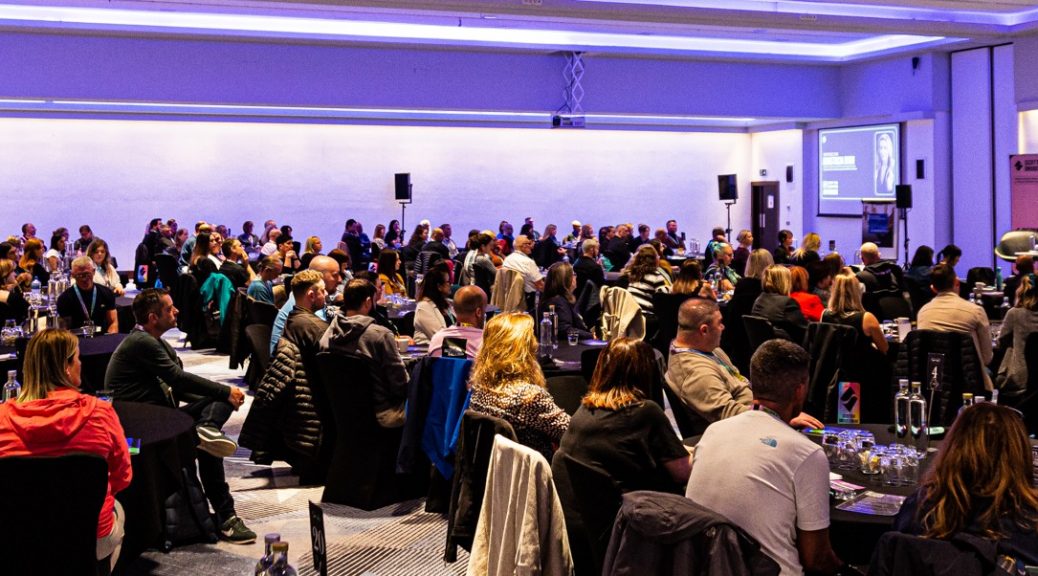At the busy city-centre hotel, visiting sports teams and tourists mingled with conference delegates in the foyer and on the pavement outside. Upstairs, stalls promoted third sector agencies and product vendors promoted their services, products and experience while delegates enjoyed pastries and caffeine-based refreshment. Acquaintances were renewed and new connections explored. Leaflets found their way into tote bags. The space buzzed with a familiar corporate polish.
The SDF’s recent Stop the Deaths conference focussed on drug deaths rather than wider substance use issues or harms associated with alcohol consumption.
The organisers’ stated aims for the conference were to:
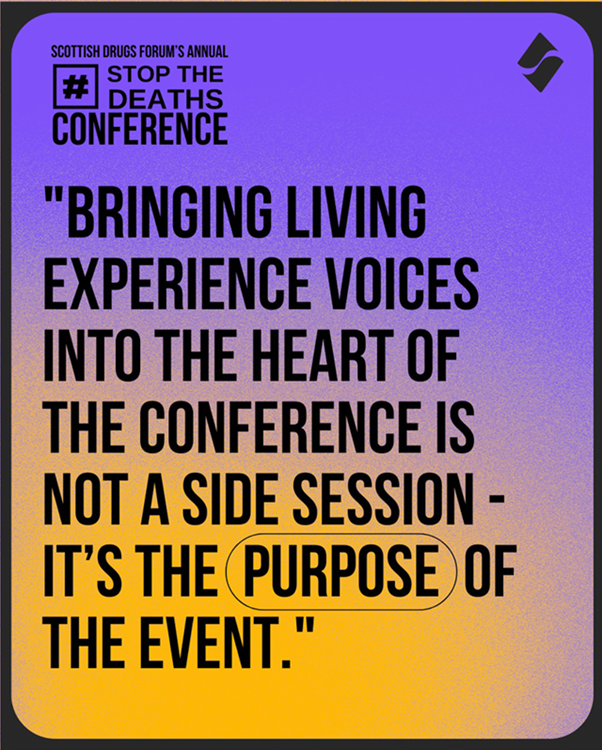
- Foster collaboration between key stakeholders to drive meaningful change.
- Amplify the voices of those with direct experience of drug-related harms.
- Explore innovative approaches to reducing overdose deaths and improving services.
- Create a space for dialogue, reflection, and action to shape the future of drug policy in Scotland.
The Government Bit
After the welcome from the SDF CEO, Kirsten Horsburgh, and the video-linked message from Neil Gray, the Cabinet Secretary for Health and Social Care, Maggie Pyle, of the ScotGov’s Drug Strategy Unit provided an update highlighted both upcoming changes in the current arrangements and the government’s commitment to follow through on current initiatives.
National and Local Government arrangement will change over the next few years with
- the National Mission ending next year,
- a new Alcohol and Drug Plan being developed
- HSCPs being reformed under a new Public Health Framework being published this summer.
But these measures are being implemented with a changing context. 58% of recent drug deaths involving cocaine or street benzos, often in association with opiates.
Advocacy for Change
Government assurances that the voices of LLE would be embedded in the change provided a neat link into the presentation by members of the SDF’s Advocate for Change initiative.
Advocates for Change have established a network of 12 Engagement Groups and the energy and voices of people with LIVING experience send a clear message.
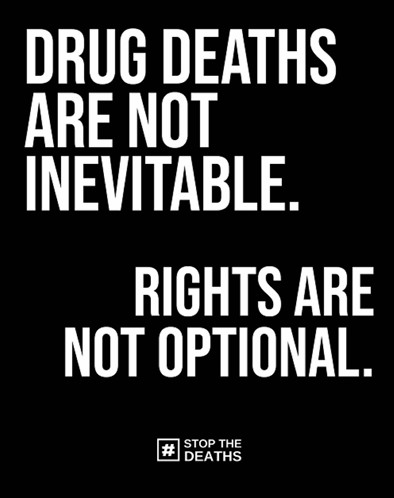
People with LLE have to ‘take charge’ and ‘disrupt systems’ because the current systems do not serve us. The Charter of Rights should be ‘our weapon’ and the community needs to offer government and agencies ‘determined collaboration’ i.e. we’re not taking ‘no’ for an answer!
The rest of the morning focussed on media issues providing a very informative and practical perspective on how to effectively frame our message and communicate with the public, especially in the face of a stigmatising media bias.
The Pros and Cons of Consultation
The afternoon session focussed on experience of Citizen’s Assemblies & Peoples Assemblies in Ireland and Scotland. The impression from both nation is that the process has been used to delay improvements. In the light of the failure to implement most of the assembly’s recommendations, one might suspect it allowed politicians to kick the issue into the long grass. There is a danger that we end up with tokenistic consultation…’well, ye were asked!’ (And then ignored) – unless we insist that consultation leads to direct and urgent action.
Safer Consumption
Eddy Mullins and Geoff Corcoran summarised their experience with the Merchants Quay safer consumption room in Dublin while Lynn MacDonald and Dan Dailly shared similar perspectives on the Thistle safer consumption facility in Townhead in Glasgow. Both contributions were informative, inspiring and underlined the challenges and opportunities before our communities.
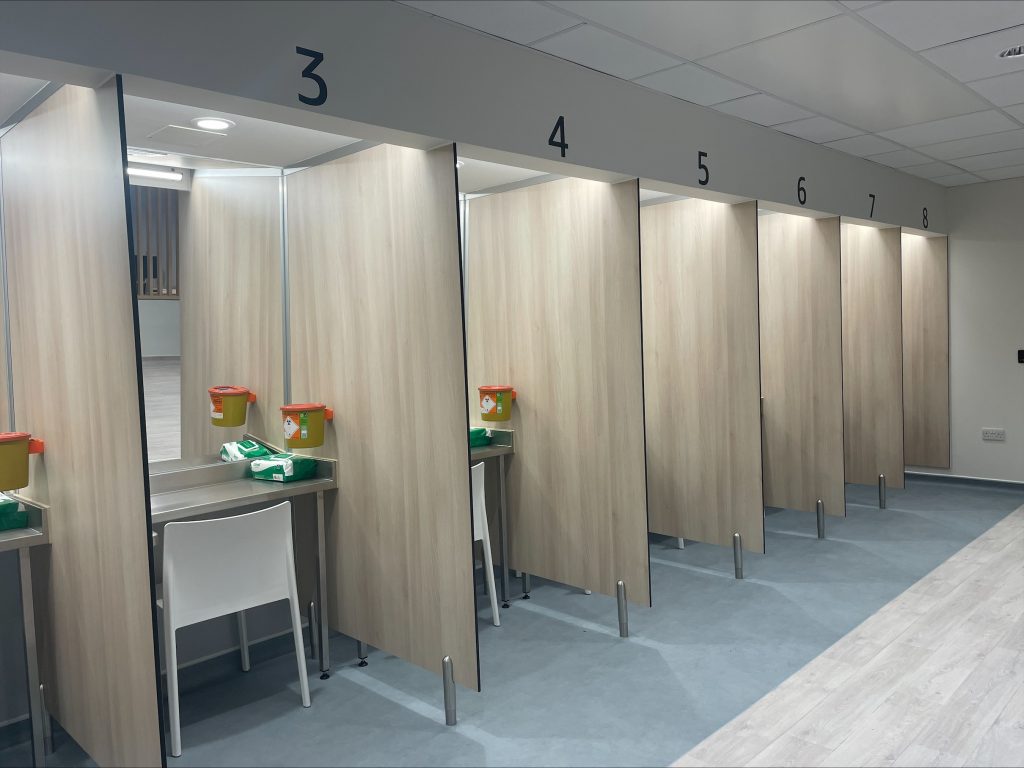
The immediate impact of these facilities seems to be wholly positive – reduced deaths, reduced stigma, improved experience and signposting into further support for those who want it though both sets of speakers highlighted the limitations imposed by regulators: for example, the consumption rooms are for injection NOT inhalation, a problem exacerbated by current trends in poly-drug use especially around crack cocaine.
Sharon Hutchison (Caledonian University) followed the presenters with a review of ‘What Outcomes Can We Expect & Measure.’ From a cost-benefit perspective, the approach seemed sound in method, with measures ranging from reduction in fatalities to the impact on local house-prices. Her evaluation is scheduled to continue until 2029, however while the people I spoke to who had used the facility felt it was a no-brainer and that pop-up facilities should be being implemented in small towns as well as the major cities asap.
Harm is a class-issue
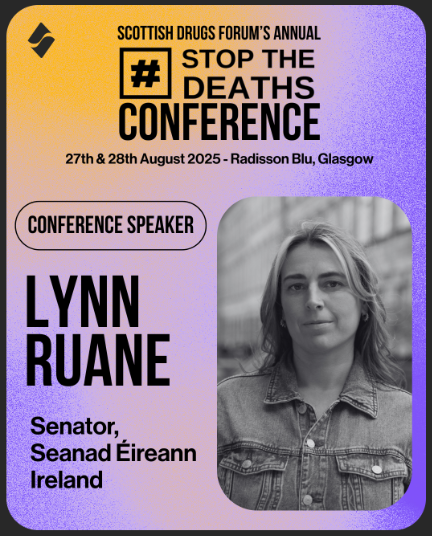
The high point of the conference was a keynote address by Senator Lynn Ruane, a member of the Irish Parliament. Lynn was beyond inspiring! Heartfelt, well-informed, streetwise and politically savvy, Lynn spelled out the key issues around decriminalisation, public health and human rights.
Although substance use is ubiquitous in Scottish and Irish society, the harms associated with substance use are massively concentrated among the poor and those experiencing current and historical deprivation. Substance related harm are, she said, a class-issue and we should beware of the ‘middle-classification of trauma’ that enables politicians to deflect attention from the (sometimes negative) effects of assertive action and criminalisation focussed on areas of high deprivation.
Advocate – to call for help
Next and following on from Senator Ruane’s speech, the audience heard presentations on advocacy from Niamh Eastwood (Release) and Jed Brady (Reach Advocacy). Both speakers told us of both the effectiveness of good advocacy and the woeful unavailability of advocates and resources. Jed highlighted that advocacy was only present in less than 10% of cases where it would be appropriate in Scotland. There remains a massive gap in the support that community members deserve in having someone – anyone! – help them in demanding their human rights, especially in the context of the Charter of Rights.
Inspiring and Thought-Provoking
Having attended both Connecting Recovery (see our blog here) and Stop the Deaths, both events were inspiring and daunting. Each looked at the issues from very different perspectives and, although there were some delegates who attended both events, the overlap did not feel very substantial.
In both, however, the importance of the Charter of Rights and of the empowerment and activism of people with Lived and Living Experience were emphasised.
Although a lot of people are working hard to improve the quality of life of people and communities affected by problematic substance use, a lot of the experiences of individuals seeking help and support is ‘very bad’ there is a way to go. Through education, communication and advocacy, through recovery-led media and direct political engagement we can make a difference.
A fuller report on the issues and presentations at Stop the Deaths 2025 can be downloaded here.
John Bolland September 2025
